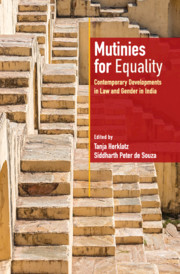4 - Juxtaposing Equality? Muslim Women’s Rights in the Normative Realm of Secularism and Personal Law in India
Published online by Cambridge University Press: 08 June 2021
Summary
Introduction
The Indian system of secularism with its transferal of adjudication in matters of the family to religious communities is often understood as pitting the constitutional guarantees of women’s equality against the rights to equal treatment of religious groups. In discourse, the plural legal system reflects as a dichotomy between a public and a private sphere. The Supreme Court’s decision in Shayara Bano v. Union of India, which renders invalid the Islamic divorce practice of instantaneous (triple) talaq, can be read against the perceived existence of such spheres.
The chapter argues that from a feminist perspective the Shayara Bano decision can, on the one hand, be understood as a milestone regarding Muslim women’s equality, as it pierces through the veil of community rights and understandings of the positioning of women in Indian society. On the other hand, however, with its focus on religion and its neglect to address the issue of gender equality under the Constitution, the judgment’s language can still be seen as perpetuating patriarchal notions of women’s identity, social status and family life. The political environment of a growing Hindu right and of societal anti-Muslim biases complicates an already multifaceted relationship of constitutional rights and personal laws in the Indian secular system.
The chapter focuses on the interrelationship of Muslim personal law and constitutionally guaranteed women’s rights to analyse multi-referential structures of (in)equality. To this end, it discusses the Shayara Bano decision and sets it in context with the recently adopted Muslim Women (Protection of Rights on Marriage) Act, 2019. In so doing, the chapter reflects on intersectional approaches in the Indian context. It closes by briefly addressing legal and activist interventions that operate within and beyond the normative area of state law towards the realisation of women’s rights, gender equality and a substantial reform of personal laws.
The Concept of Secularism and Religious Group Rights
Several different conceptions of secularism have been suggested in India. The basic understanding emphasises equality and non-discrimination of all religious groups as well as a commitment to individual freedom of religion. The religiously heterogenous landscape in India does not encourage an absolute division of state and religions, but an ‘equidistance’ to all religious groups.
- Type
- Chapter
- Information
- Mutinies for EqualityContemporary Developments in Law and Gender in India, pp. 74 - 88Publisher: Cambridge University PressPrint publication year: 2021



